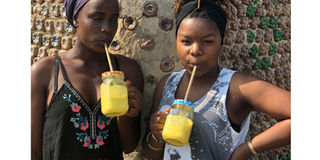Biodegradable straws: For a plastic-free future

Two women tale juice through biodegradable straws. Photo by Dorothy Nakaweesi
What you need to know:
- Price. According to Nakawuki, the group produces 5,000 straws which are then packaged in 25 pieces where each pack goes for Shs25,000.
Because of increased demand, the group is soon looking out to boost production to 50,000 per week.
While different governments worldwide are advocating to ban single-use plastics such as plastic drinking straws and polythene bags which are not biodegradable, no alternative has been provided for people to use.
This, according to some circles is not going to solve environmental degradation.
To find a lasting solution to some of these challenges, some people are inventing environmentally friendly products. Biodegradable drinking straws are an innovation creating an alternative to plastic straws with the view of reducing plastic waste.
Motivation
This innovation is being developed by a group of youth working under- Ouroots Africa Project at SINA (Social Innovation Academy) in Mpigi.
SINA tackles failing education and unemployment in Uganda through creating self-organised and responsible learning spaces, where disadvantaged youth unleash their potential for positive change as social entrepreneurs.
In March this year, equipped with $50 (Shs183,000) as initial investment capital, the group started business.
Ms Stella Nakawuki Lukwago, Ouroots’ Group leader, says the project provides sustainable alternatives to single-use plastics.
“We had very many ideas. But we realised that talking about plastic waste, its effects, and the environment is actually not enough. So we had to bring in something tangible for the market that can work as an alternative. That’s how the idea of Biodegradable straws was rebirthed,” Nakawuki says.
On realising the need, Nakawuki and her colleagues thought of those great things their ancestors used before plastics came to Africa.
“Before plastics were invented, our grandparents had a way out. So we thought what was that exact way in which they used to live and how did they use to live,” she narrates.
After consultations with the elders in the community, their parents and grandparents about the alternatives they used to drink with before plastics came.
She says: “Most of them told us that they used to have biodegradable, compostable, reusable straws. Many were referring us to different types of straws but there was one which was so peculiar for us.”
It was just a normal grass that you don’t need to grow because you can just find it in the bushes. But since not everyone knew about it, it had been abandoned.
So they started scouting and doing research. Eventually, they found what it looks like and where this grass grows.
“We found it grows in very many people’s bushes and gardens. Often, it is just lying there,” she explains.
“Since it is everywhere and very many do not think it is useful, we devised means of re-inventing it to share our culture with the rest of the world,” she narrates.
Production process
Because this type of grass mainly grows by itself and can be found everywhere in the wilderness, this simplified the search for raw materials.
Currently, they collect the grass from different regions around Uganda such as Masaka, Lwengo, Mpigi and Rukungiri among others.
The group contracts local women who identify, collect and pile it in one big centre where the grass is ferried to their processing in Mpigi.
At the processing centre in Mpigi, the product (grass) is then taken through another procedure of sanitisation, cutting and smothering – (where you put the upper mouth so that the product is of good quality). Then the straws are packaged and ready for the market.
“We then put a washer inside each package so that the person can rewash it and reuse every time,” Nakawuki added.
Market
At first, the group was not sure whether the Ugandan market would be interested in biodegradable straws.
“Our initial plan was to produce for the export market but also share our culture with those people who had never seen what these straws look like,” she narrates.
But when the Ugandan market responded positively, the group started producing for the local market too.
Currently, they are selling the straws to restaurants which attract tourists, experts, some Ugandans and middle class like Ujo, Front liners Tour Company and Wild Waters lodges.
Their latest addition is Latitude Zeros Hotel in Makindye, Kizungu which has placed an order for them to supply 1,000 straws.
They also supply the straws to Eco-Lodges because they understand the impact of using sustainable alternatives.
“We have also seen individuals, tourists and experts place orders for our straws in shocking numbers,” she shares.
Challenges
At first, the group didn’t think the biodegradable straws which are reusable will need a washer to go with it.
“For us, we would just sell our straw pack and the rest was the customer’s business. But later, the customers were saying the product needs something, to clean it,” she explains.
The other challenge the group experiences is in securing their patent rights for their creation.
Outlook
Within this year alone, the group has received international attention and visibility through media. The group has done interviews with TRT World, Chinese Global Television (CGTN). They are optimistic this will expose them to the rest of the world. The group wants to see its brand Ouroots Africa in stores in every supermarket.




